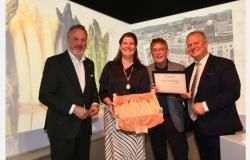
Access gates through which a wheelchair cannot fit, face scans at ‘eye level’, steps to reach the seats in the plenary hall, a lectern that he cannot rise above, limited access to the public gallery, deep-pile carpet. A tour of the House of Representatives with Max Gerets, a wheelchair-bound intern at the GroenLinks-PvdA parliamentary faction, poses enough difficulties. Nobody really seems to take people with disabilities into account.
Gerets, the only person in a wheelchair working in the House building, cannot go to the toilet in his own party hallway. “Then I have to go to Volt or the SGP,” he says in the ‘freight elevator’ – only recently was it added to the sign that it is also intended for people in wheelchairs.
Once he arrives at the committee room for a round table discussion in the House of Representatives about the rights of people with disabilities, he is almost denied access. The limited number of wheelchair spaces are already occupied by the speakers. “It’s very simple: you can’t get me out of here, this is also about me,” is his response, after which a place is found. “Many people have only realized these kinds of things since I started working in Parliament,” says Gerets. “If you don’t experience it, you don’t think about it.”
That is precisely why Member of Parliament Lisa Westerveld (GroenLinks-PvdA) organized the round table discussion on March 20 about the UN Handicap Convention, which should improve the position of people with disabilities. Not only with directors of interest groups, but with personal stories of people with various disabilities, from intellectual to physical. According to Westerveld, groups with very intensive care in particular are easily overlooked, “because they find it difficult to find politics.”
National strategy
The Netherlands ratified the UN Convention on Disability in 2016. The House of Representatives will debate it on Wednesday. The treaty obliges the state to ensure that people with disabilities can enjoy all human rights and fundamental freedoms, without discrimination on the basis of their disability. Last year, disability was explicitly added to Article 1 of the Constitution, the prohibition of discrimination, together with sexual orientation.
The Netherlands is not there yet, the Netherlands Institute for Human Rights, which monitors compliance with the treaty, also concluded in their annual report in December. For example, public transport is still inaccessible for many people with disabilities, preventing them from “really participating,” which can lead to “loneliness, social isolation and dependence on others.”
To comply with the UN treaty, the government presented a national strategy in February this year. The government will take until 2040 to ensure that people with disabilities have “the same opportunities as everyone else to participate and develop.” The next step, drawing up a concrete work agenda, is left to the next cabinet by the outgoing cabinet.
‘Monty Python-esque’ bureaucracy
From a visually impaired woman who cannot complete social assistance administration due to her disability to a mother of a child in need of care who has to navigate through “thirty different arrangements” and has the feeling of being sent from pillar to post. “Monty Python-like,” Theo van Uum, director of the Association for Disabled Care Netherlands (VGN), summarized the situations of many speakers.
The common denominator of many stories is an almost palpable desire to be able to ‘just’ participate, exactly what the UN treaty is intended to ensure, but there is a tangle of different laws that prevents this. “Many people are not so much bothered by their illness or disability, but are bothered by what it costs to find their way in life,” said Illya Soffer, director of Elke(in), an umbrella organization for people with a disability or chronic illness. .
Also read
Plan to pay disabled workers less
No ‘quick fixes’
Soffer thinks that the stories made an impression on MPs, but sees that politicians often look for ‘quick fixes‘. “There are none,” she warns. “Since the decentralization in 2015, people who need lifelong support have been left out in all kinds of ways. There are too many different laws and it is completely arbitrary which law you fall under and what support you can or cannot count on.”
Also according to the Association for Disabled Care Netherlands (VGN), the position of disabled people has “not gotten better, but worse” since the decentralizations in the social domain. Director Van Uum: “We have organized care for the disabled within too many domains, within too narrow frameworks. We have created a kind of fragmented, parallel society for people with disabilities. Where possible, you want people to simply go to school and work, instead of going to separate schools and daytime activities.”
Van Uum and Soffer both emphasize the need for an integrated policy that transcends various ministries. Van Uum: “Civil servants set up an excellent arrangement within their own domain out of good will, but clients just don’t fit in and fall in between everywhere.” Soffer: “We propose a commissioner who coordinates between departments, government and municipalities, across cabinet terms. The fact that people can participate in society is not a favor or charity, but a human right.”
To share
Email the editor
Tags: Chamber debates fragmented disability policy dont experience dont
-




